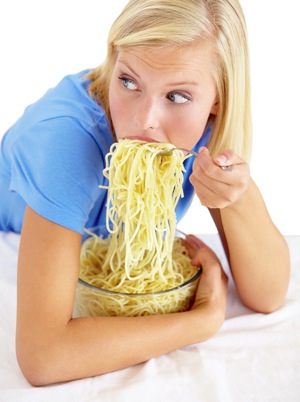
Scientists may have confirmed what millions of us could have already told you: One cookie is too many and 20 are not enough. Many people have found they can go along comfortably on a diet free of sweets, pastries, and desserts until they have that one bite. Then—zing!—the addiction sets in and you feel like you might die if you don't eat more. Turns out you’re not weak or gluttonous, it's just your brain responding to the highly pleasurable and stimulating effect of cookies, cake, chips, and candy as if they were powerful drugs (which, really, they are). It's no mystery why they're also referred to as comfort foods.
These processed carbohydrates appeal to the same parts of the brain involved in substance abuse and addiction, as anyone with a carb addiction can tell you. A major player in addiction is the neurotransmitter dopamine, which gives us the feeling of reward and pleasure associated with activities that can be addictive. For instance, drug use, smoking, and gambling all release dopamine. In rat studies, rats given the option of pressing a lever that stimulates dopamine's pleasurable effects or a lever for food chose the dopamine to their death.
In the recent study, researchers gave two groups of overweight men a milkshake. One group's milkshake was higher on the glycemic index than the other group's. This means it was sweeter and more processed, causing blood sugar to rise more quickly and then crash. Then four hours later researchers scanned the brains of both groups using an MRI.
The men receiving the high-glycemic milkshake felt excessively hungry and scans revealed intense activation in the area of the brain involved in addiction. These brain changes can trigger overeating.
Avoid high-glycemic foods
Avoiding triggering the pleasure centers of your brain with food is one of your most powerful allies in healthier eating and weight loss. Eating a whole foods diet that is satiating and prevents hunger is key to curbing cravings and taming carb addiction. This means including healthy proteins and fats to stabilize your blood sugar and sustain your energy, as well as plenty of vegetables for the fiber, which also helps keep your energy on an even keel.
The glycemic index measures how quickly foods become glucose after you eat them. The glycemic load factors in the amount of the carbohydrate eaten. So although a piece of candy has a high glycemic index, the glycemic load might be small if you eat a very small piece.
High-glycemic foods that can trigger carb addiction include:
- White potato
- White rice
- White bread, bagels, muffins, rolls, etc
- Pastries, cake, cookies, etc.
- Breakfast cereal
- Popcorn
- Dried fruit
- Ripe banana
- Soft drinks
- Fruit juice
- Pizza
- Candy bars
Ask my office for more strategies on how to turn off carb addiction in your brain.



Latest from the Blog
The Dirty Dozen
August 19, 2024The “Dirty Dozen” is a list of fruits and vegetables, compiled by the Environmental Working Group (EWG), that you should always eat organically. These produce items are not only delicious and nutrient-rich but also tend to carry high levels of pesticide residues when grown conventionally. By opting for organic versions, you can significantly reduce your […] Read more
Latest from the Blog
3-Day Detox Plan
Here’s a 3-day detox meal plan tailored to be autoimmune-friendly and compliant with functional medicine principles. This plan emphasizes anti-inflammatory, nutrient-dense foods while avoiding common triggers for autoimmune symptoms. Day 1 Breakfast: Green Smoothie Bowl Ingredients: Spinach, kale, cucumber, green apple, avocado, coconut milk, chia seeds. Why: Spinach and kale are rich in vitamins A, […] Read more